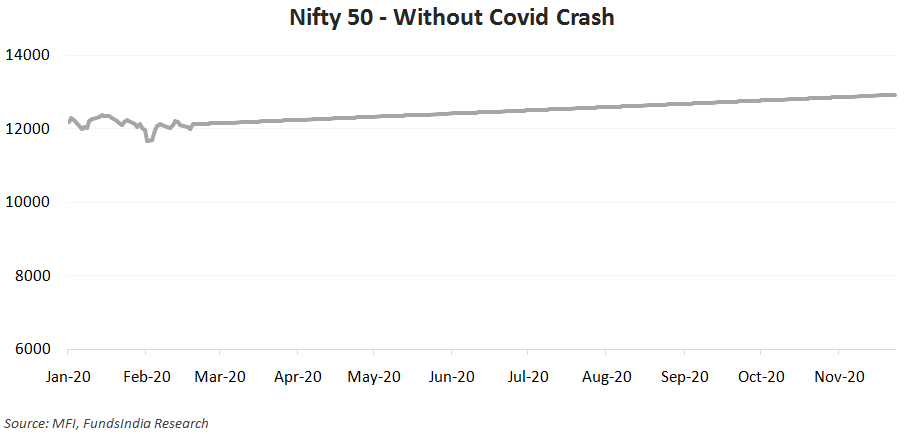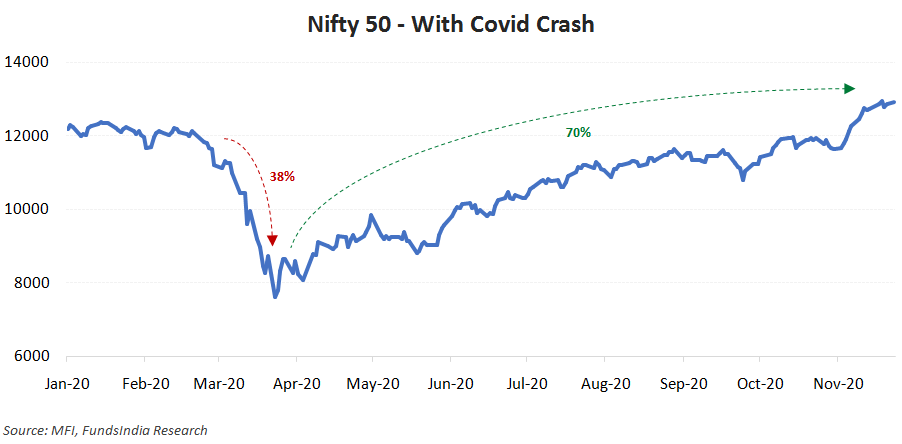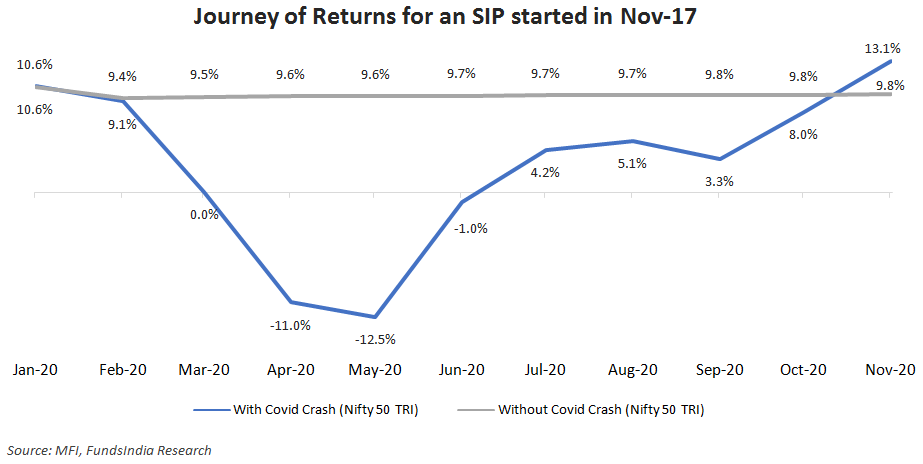Have you seen the movie Sliding Doors?
Sliding Doors is a 1998 romantic-comedy-drama film with a super cool plot.

You can check out the trailer here to get a sense of the movie 🙂
For those yet to see the movie, here is a quick glimpse into the story…
When Helen (Gwyneth Paltrow), a London ad executive, is fired from her job and rushes out to catch a train, two scenarios take place. In one, she gets on the train and comes home to find her boyfriend, Gerry (John Lynch), in bed with another woman. In the second, she misses the train and arrives after the woman has left.
How Helen’s life unfolds in these two different versions forms the rest of the story.
Now you are obviously wondering – “What does this have to do with investing?”
The brilliance of the movie Sliding Doors is the presentation of two ‘what if…’ scenarios.
“What if” and the Equity Markets…
Taking inspiration, we decided to do a comparison of two scenarios for equity markets.
Scenario 1: What if Covid-19 had not impacted us this year and the Indian equity market had a smooth journey till today’s levels – without the scary ~38% correction which we saw in Mar-20?

Scenario 2: The actual scenario where Covid-19 impacted the world and the Indian markets had crashed in Mar-2020.

Now here is a simple question for you…
Let us take the case of an Equity SIP investor who has been investing Rs 10,000 each and every month in the Nifty 50 for the last 3 years. In which of the above scenarios would the SIP perform better?
Is it the one where there was a ~38% fall?
Or the one where there was hypothetically no fall and the markets smoothly climbed to today’s levels from January-2020 highs?
Take a guess.
Going by our intuition, looks like it should be the one where there was no market crash right?
Hang on. Let us check the actual data…

WOW! CAN YOU BELIEVE THAT?
The SIP returns for the actual scenario with the ~38% crash is a whopping 3.3% higher than the SIP returns for our hypothetical scenario without the crash!
What’s happening? Someone care to explain?
The logic is simple.
A SIP simply buys mutual fund units each and every month for the same amount. So if equity prices fall you buy more mutual fund units and vice versa.
Now this implies as long as markets recover and move up over the long run, a SIP will do extremely well if there are more declines.
But why?
Because you end up accumulating a lot more units at a lower cost!
This is exactly what happens in the above case.
The 40% crash allows you to accumulate a lot more equity fund units at a much lower price compared to a scenario where there is no crash.
Wow! If an Equity SIP does so well to take advantage of market falls, why is it so tough to hold on to an Equity SIP?
As with all things in life, higher long term SIP returns means you need to take up short term pain and uncertainty.
Let us see how the SIP returns would have looked under the two scenarios for an investor every month from Jan-20 till Nov-20.

Ah! There you go.
While a market fall benefits SIP investors post the recovery, in the middle of a crash, the returns are super dismal and emotionally taxing. Add to it the stress and uncertainty of not knowing how long the fall will continue.
This is exactly when most of us give up on our faith in equities (read as Indian entrepreneurship) and expect the markets never to recover back again.
History has shown us time and again that markets despite all the several crises in the past have always recovered and moved up in the long run.
So while it is logical from our side to ask you to continue your Equity SIPs in the middle of a market crash (see our earlier articles here and here), if you do not believe in equities for the long term and are not convinced that the markets will recover, you will most likely stop your SIPs and end up having a bad overall experience.
As seen above, we have shown you how SIPs benefit from volatility (read as declines and recovery). Frankly speaking, we think the problem has never been about not knowing that SIPs benefit out of volatility. But the real challenge, in sticking to a simple but powerful strategy like an Equity SIP finally boils down to your “Faith” in equities.
Just like how it was tested in March-2020 it will be tested again for sure, several times over the next decade.
So before you start your SIP – the key question to ask is “Do you have faith in equities?”
An honest answer to this question will determine the success of your SIP investing!
Summing it up
As an Equity SIP investor, if you have a long time frame (say more than 7 to 10 years), you need to pray for frequent market declines. As weird as it sounds, the more the intermittent temporary crashes, the higher is your Equity SIP returns.
While it is obviously painful to see extremely low or sometimes even negative returns for your SIP investments in the middle of a fall, this is exactly where your SIP is working its hardest and accumulating higher mutual fund units at lower prices.
So whatever happens, do not stop your equity SIPs during a market fall.
And for this to happen – it all finally boils down to “Faith” in Equities.
Do you have yours?









Truly insightful. An eye opener.